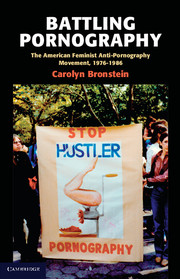Book contents
- Frontmatter
- Contents
- List of Figures
- Acknowledgments
- Introduction: Battling Pornography
- 1 Seeds of Discontent
- 2 Male Violence and the Critique of Heterosexuality
- 3 Have You Seen Deep Throat Yet?
- 4 “I'm Black and Blue from the Rolling Stones and I Love It!”
- 5 Something Inside Me Just Went “Click”
- 6 Growing Pains
- 7 Porn Tours
- 8 The New Lay of the Land
- 9 Anti-Pornography Comes Undone
- Conclusion: Porn Is Here to Stay
- Bibliography
- Index
- References
2 - Male Violence and the Critique of Heterosexuality
The Influence of Radical Feminism on the Anti-Pornography Movement
Published online by Cambridge University Press: 05 June 2012
- Frontmatter
- Contents
- List of Figures
- Acknowledgments
- Introduction: Battling Pornography
- 1 Seeds of Discontent
- 2 Male Violence and the Critique of Heterosexuality
- 3 Have You Seen Deep Throat Yet?
- 4 “I'm Black and Blue from the Rolling Stones and I Love It!”
- 5 Something Inside Me Just Went “Click”
- 6 Growing Pains
- 7 Porn Tours
- 8 The New Lay of the Land
- 9 Anti-Pornography Comes Undone
- Conclusion: Porn Is Here to Stay
- Bibliography
- Index
- References
Summary
Chapter 1 established women's ambivalence toward the freer sexual climate that characterized life in the United States by the late 1960s and early 1970s, and their realization that unfettered sexuality was not the decisive source of liberation that many women had hoped it would be. In this chapter and the one that follows, I explore related cultural conditions – here, the growth of the radical feminist wing of the Women's Liberation movement and in Chapter 3, the rise of the commercial pornography industry – which gave women a framework for interpreting measurable changes in sexual behavior as problematic. Through the lens of radical feminist theory, women saw trends in intimate life such as the increased expectation that contraception was a woman's obligation, as heterosexist means of enlarging men's sexual rights. The pornography industry, in turn, celebrated and marketed male sexual entitlement through depictions of women as eager sexual slaves, and idealized X-rated film heroines like Deep Throat's Linda Lovelace as truly liberated women whom American females ought to emulate. This chapter explores theoretic developments in radical feminism that contributed to a powerful critique of heterosexuality as an ideology and institution of male supremacy. Through this critique, many women began to regard (heterosexual) sex as a primary force of oppression. The anti-heterosexual perspective that emerged from radical feminism in this period laid the groundwork for the beginning of an anti-pornography analysis in the mid-1970s.
- Type
- Chapter
- Information
- Battling PornographyThe American Feminist Anti-Pornography Movement, 1976–1986, pp. 38 - 62Publisher: Cambridge University PressPrint publication year: 2011



